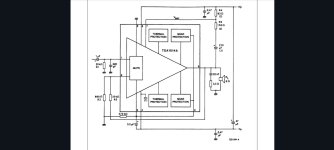I'm going to put together a couple chip amps, and want to ask if anyone had recommendations for suitable switch mode power supplies that work OK in this application. Going to use TDA1514A and TDA2050, looking for a 24V power supply that can be tweaked up and down a bit, and can be bought off the shelf from mouser or digikey
So like this one for example?
https://www.mouser.ca/ProductDetail/MEAN-WELL/LRS-100N2-24?qs=HoCaDK9Nz5cQ1q5sDGpBnA==
Can you really hang 10,000uf caps on the output of this? As for the capacitance multiplier, you mean this kind of circuit?

https://www.mouser.ca/ProductDetail/MEAN-WELL/LRS-100N2-24?qs=HoCaDK9Nz5cQ1q5sDGpBnA==
Can you really hang 10,000uf caps on the output of this? As for the capacitance multiplier, you mean this kind of circuit?
What are the consequences of using them "raw", to directly power a chip amp (assuming bypass capacitors are used on the chip amp board, per data sheet) versus having an intermediate filter stage, in terms of performance?
I'm thinking specifically about the TDA1514A here.
I'm thinking specifically about the TDA1514A here.
According to the lm3886 datasheet the chip needs 1000uF+22uF+0.1uF next to its pins, some of these smps cannot handle that much capacitance.
I guess the capacitance multiplier could be used for that reason and not so much for improving the performance of the amps.
I guess the capacitance multiplier could be used for that reason and not so much for improving the performance of the amps.
Last edited:
As long as the SMPS can handle the added capacitance it'll work just fine. You'll get some of the SMPS switching frequency trickling through to the amp output, but it's well into the ultrasonic frequency range and usually at very low levels, so it's not an issue except if you include the switching frequency in the measurement bandwidth in a THD+N vs frequency sweep for example.What are the consequences of using them "raw", to directly power a chip amp (assuming bypass capacitors are used on the chip amp board, per data sheet) versus having an intermediate filter stage, in terms of performance?
Older chip amps don't have stellar PSRR at common switching frequencies, so you'll get a bit more of the switching frequency trickling through than you would for a more modern design, but that's the only drawback.
If you find the SMPS switching frequency residual troubling you can always add an LC filter at the output of the SMPS. Make sure it has a good amount of attenuation at the switching frequency and tame the Q so it isn't super peaky.
Tom
That hasn't been my experience. I've measured my Modulus amps powered by an SMPS and by a 'linear' supply. They measure the same. If the SMPS injected any noise into the ground I wasn't able to measure it.SMPSs are good and reliable choice but they will always inject HF noise into the ground and it is very difficult / impossible to get rid of it.
I've used: Connex SMPS300RE, SMPS800RE; Mean Well RPS-series, LOP-series, IRM-series, and many others.
That said, some SMPS bricks, especially laptop chargers, seem to dump a lot of garbage into the ground on the output.
Maybe SMPSes aren't all created equal.
Tom
So with the RPS-200-24, I see 120mV maximum ripple. The TDA1514A data says 68dB of power supply ripple rejection at 100Hz, which is not guaranteed at higher frequencies but is probably some idea of what to expect. This looks OK to me, should be enough signal to noise ratio to be drowned out by my furnace fan motor. And I note differences in ratings for convection versus fan cooling - this should give some headroom for peaks. I have to say though the amazing spec is weight - 190 grams! I'm not going to be finding a toroidal transformer that weighs 380 grams and puts out 400W, that's for sure!
The noise floor on the Modulus-86 is about 17 µV RMS (20 kHz BW).If the noise floor of your amp is not low enough then it would mask the noise of the SMPS.
Tom
Smps sound different:
Got a stereo TDA3116 ampflifier and with 2.5A, 24v smps it sounds great.
Tried a much stiffer power supply with 12A and yes, there is more power but its less enjoyable.
So I would listen to different types and then decide.
From a technical standpoint stiffer supply must be better
Got a stereo TDA3116 ampflifier and with 2.5A, 24v smps it sounds great.
Tried a much stiffer power supply with 12A and yes, there is more power but its less enjoyable.
So I would listen to different types and then decide.
From a technical standpoint stiffer supply must be better
- Home
- Amplifiers
- Chip Amps
- SMPS recommendations?
